Calling on the CT legislature to protect girls from FGM/C
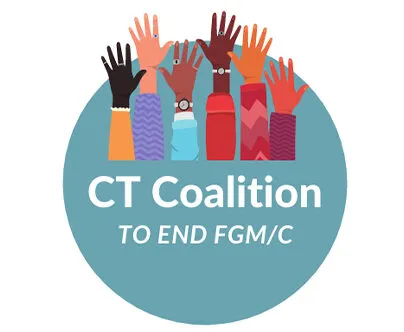
A bill to protect children from female genital mutilation/cutting (FGM/C) in Connecticut (CT) has not been raised by the Connecticut Judiciary Committee in the 2024 legislative session. This news comes as a shock to many survivors of FGM/C and anti-FGM/C activists who have been campaigning for the bill to be introduced. The bill would have been sponsored by Rep. Jilian Gilchrest (D), and would have created education and outreach programs, issued civil remedies for survivors, and created better access to healthcare for survivors of FGM/C. Additionally, the bill would have made it clear that FGM/C is a criminal offense in Connecticut. Currently, Connecticut is only one of nine states left in the U.S. that have no explicit legal protections against FGM/C. Over 2,600 girls are at risk of experiencing FGM/C in Connecticut. Around the country, over half a million women and girls are at risk or are survivors of the practice, according to the Centers for Disease Control and Prevention. Additionally, Connecticut is surrounded by states that have outlawed the practice including New York and Massachusetts. By not following suit, Connecticut could become a safe haven for people who are seeking to practice FGM/C on girls from other states where the practice is illegal. Let’s urge the Connecticut legislature to prioritize the passage of this crucial legislation because every girl deserves to grow up safe and empowered. Join us in advocating for the protection of girls from female genital mutilation/cutting (FGM/C) by calling on your representatives in Connecticut to take action. Your support is crucial in safeguarding the rights and well-being of vulnerable children in Connecticut. Sign this call to action now! For more information, please visit the CT Coalition website.
Zehra Patwa on Sahiyo and the Coalition to End FGM/C’s recent panel discussion with Connecticut legislators – and why it was a positive step forward
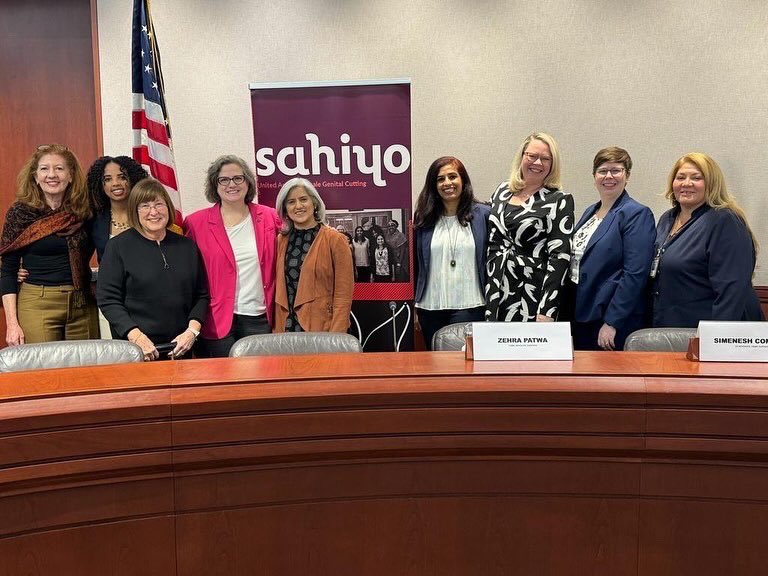
By Sheena Vasani Connecticut is one of nine states that have yet to enact a law protecting children from FGM/C, which is why Sahiyo along with other Connecticut Coalition to End FGM/C members recently held the “Preventing FGM/C in Connecticut – Why Comprehensive Laws Matter” event. On January 25th, panelists educated legislators about the urgent need for FGM/C laws in Connecticut, highlighting their personal and professional experiences connected to FGM/C while sharing resources to learn more and support survivors. Panelists included FGM/C service providers, various women’s rights advocates, FGM/C survivors and advocates and of course, Sahiyo’s very own co-founder and U.S. Executive Director, Mariya Taher. I had the opportunity to talk to one of these panelists, Zehra Patwa. A resident of Connecticut, Zehra has lived in the state for 28 years. She is also the co-founder of WeSpeakOut, an organization that aims to help empower women and end FGC in the Bohra community. During our conversation, Zehra reflected on the event and why she felt it was a success, while making it clear why all Americans should care about outlawing FGM/C in Connecticut. Urge the Connecticut State Legislature to outlaw FFM/C by clicking here and signing this petition! Why did you decide to participate in the event? When I found out that I had been cut – and that my community was one that cuts girls – I was 42 years old. To this day, I have no recollection of my cutting, but it felt like such a violation so I started [speaking out]. It just felt like the right thing to do – how could it not? I’ve been lucky to have this great life, and, yet, there are women who, to this day as adults, suffer psychological and sexual impact because this happened to them. Could you tell me about your experiences at the event? What stood out for you? All the panelists were so well prepared that we came across as very organized, and professional. And I think that’s what the legislators needed to hear. I imagine it might have been different if we had started wailing and crying, but [we showed] that we really understood all of the aspects of this issue, and its sensitive nature.We were all able to give a different perspective on the issue and amplify why we needed a law in Connecticut. What kind of insights, if any, did you gain? I was really heartened by the fact that there was so much support and I know the coalition has worked very hard to build that support. Sometimes, it’s like you’re crying out into the void and it feels like nothing is moving forward, but now we’ve arrived at this point. I realize that all of those small steps that we took – reiterating our experiences over and over again – really helped as it culminated in where we are today. So that was pretty powerful. I felt faith in the process again. Why do you think Connecticut is one of the nine states that has yet to outlaw FGM/C? I think the biggest reason is that they didn’t want to enact new criminal laws that might impact immigrant communities. People want to be sensitive to black and brown bodies that may have come from communities that cut their daughters. I applaud Connecticut for this sensitivity but in the end, FGC needs to stop and girls need to be protected. Why do you think those who live in Connecticut – and indeed, Americans generally – should care about outlawing FGM/C? People don’t think that girls in Connecticut are at risk. Yet the fact is, we’re one of the only states that does not have an anti FGM/C law so we could easily become, if we’re not already, a destination for cutting. We absolutely do not want to be known for that. There are [also] communities who cut their daughters who have been in America for generations – they’re not new immigrant communities. So, as Americans, we should be taking care of our communities. I see this FGM/C law as a simple bill to pass. It fits in with other services that are already available and provides specific FGM/C related education and support for prevention and care. [But] at the heart of this, there is a little girl who is suffering, and is going to potentially suffer all of their life, because they’re told they’re not good enough and need to be fixed. That’s just not a humane way to view a child. We give parents a lot of leeway, but parents don’t – or can’t – always make the best decision. I realize that there are parents who feel very pressured to do this by the elders in their family or community. If we have a law that protects girls from FGM/C, it would give parents the strength and backup to say no. They can [tell people in their community] “look, I don’t want to be a criminal. If I protect my child, I avoid the risk of prison.” What can we as activists do to help outlaw FGM/C in Connecticut? Spread the word that this is happening here and that this is very much a contemporary practice. We don’t have numbers [for Connecticut] as this is such an underground practice but as I said on the panel, that number almost doesn’t matter. If one girl is cut, that’s one too many. Education is the key. Up until 10 years ago, I didn’t even know this was happening in my community. I grew up with very educated, talented women [with] great careers who were impressive mentors and role models, and my community was pretty progressive. But […] all of those women were cut and many of them also cut their daughters. This was a practice that people just accepted as being a fact of life in the community. But with education and shared stories, that is changing. You can watch a recording of the “Preventing FGM/C in Connecticut – Why Comprehensive
Connecticut Hosts a Legislative Briefing on Jan 25th
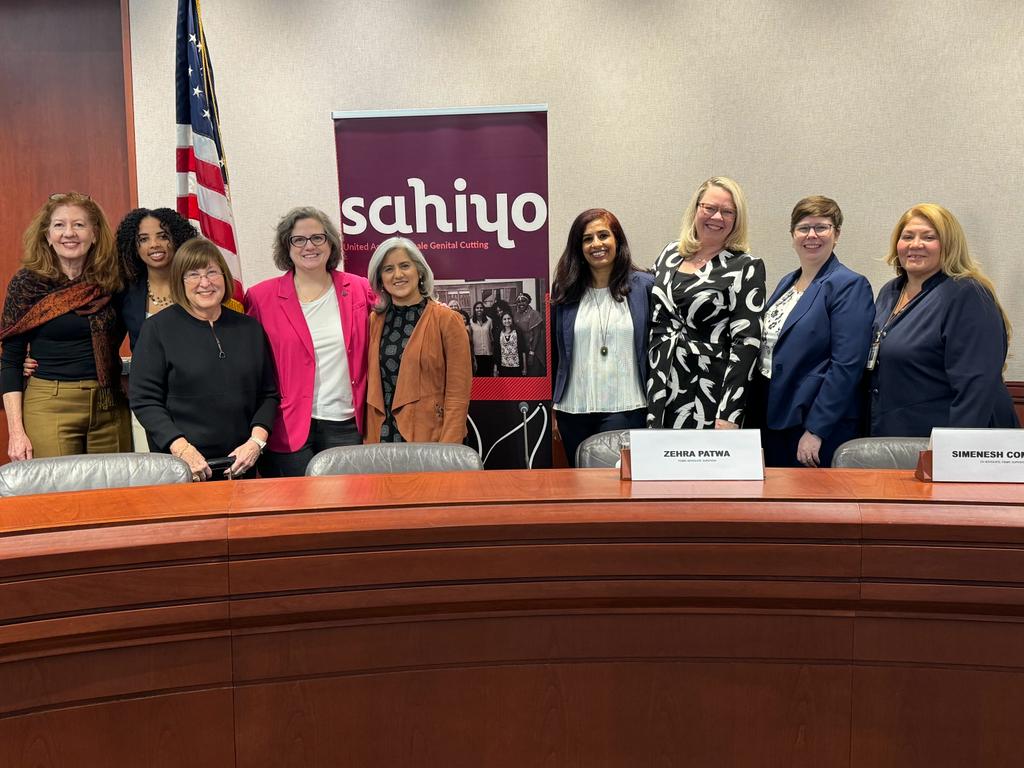
On January 25, 2025, the Connecticut (CT) Commission on Women, Children, Seniors, Equity and Opportunity, Representative Jillian Gilchrest, CT General Assembly Bi-Partisan Women’s Caucus, and the CT Coalition to End FGM/C held an event, just prior to the next legislative session, entitled Preventing FGM/C in Connecticut – Why Comprehensive Laws Matter. Special guests and co-hosts included Lieutenant Governor Susan Bysiewicz and the Governor’s Council on Women & Girls. The panel discussion that occurred during the event provided timely information and resources for legislators and their staff about FGM/C in the United States, as well as the need for comprehensive state laws to end the practice. Panelists shared their experiences and lessons they learned from legal reform processes in other states, which highlighted the important role of the law in changing social norms as well as protecting survivors, girls at risk, and society as a whole. The diverse panel of international, national, and local experts included women’s rights advocates, FGM/C service providers, and FGM/C survivors such as: Moderators: Rep. Jillian Gilcrest Steven Hernández Panelists Siminesh Comollo, CT Coalition to End FGM/C Caitlin LeMay, The US End FGM/C Network Zehra Patwa, Co-Founder and US Lead, WeSpeakOut Mariya Taher, Sahiyo: US Jill Thompson, Equality Now To date, 41 US States have enacted laws prohibiting the practice of FGM/C. Connecticut is one of nine states that has not yet addressed this harmful practice. This event was held in partnership with Sahiyo U.S.ahiyo U.S., Equality Now, and, the US End FGM/C Network.S End FGM/C Network. Watch a recording of the event here. In support of passing a law on FGM/C, this February 6th – International Day of Zero Tolerance for FGM/C, Governor Ned Lamont issued a Proclamation and Lieutenant Governor Susan Bysiewicz issued a Citation to commemorate the day.
Legislative Roundtable held in Connecticut to discuss FGC
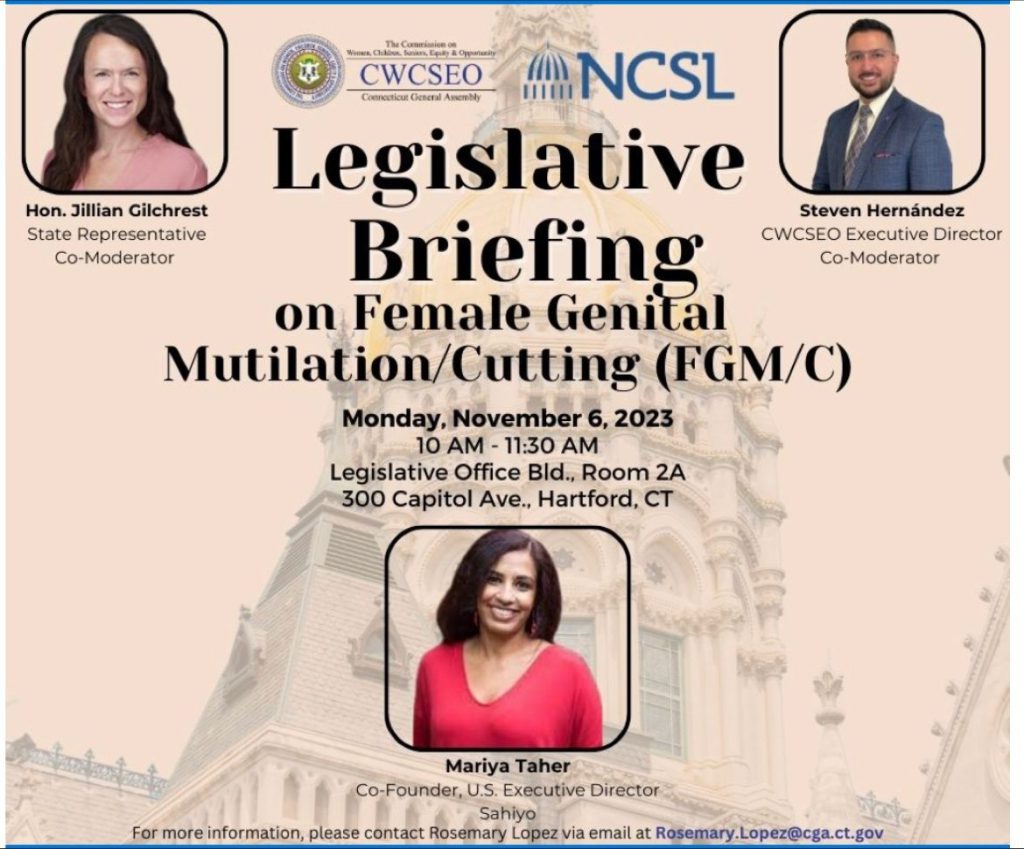
On November 6th, Sahiyo, as part of the Connecticut Coalition to End FGM/C, supported a legislative briefing on the topic of female genital cutting (FGC) hosted by the Commission on Women, Children, Seniors, Equity and Opportunity (CWCSEO) and Connecticut Representative Jillian Gilchrest. Special guests included Mariya Taher, Co-Founder and U.S. Executive Director of Sahiyo, as well as experts from the National Conference of State Legislatures (NCSL). Connecticut remains one of only 9 states in the U.S. yet to address this human rights violation in any manner; this briefing provided insights into the legislative landscape surrounding FGC in the U.S., as well as progress made, challenges faced, and how to move forward in addressing FGC. NCSL also summarized the laws addressing FGC in the 41 states. The Connecticut Coalition to End FGM/C will continue to advocate for a bill to be introduced into this next legislative cycle, starting in January 2024, in hopes that CT legislation will recognize the need to promote a safer, healthier future for all in the state. Learn more about Sahiyo’s policy work here.
My experience at the Global Woman Awards and Walk to End FGM
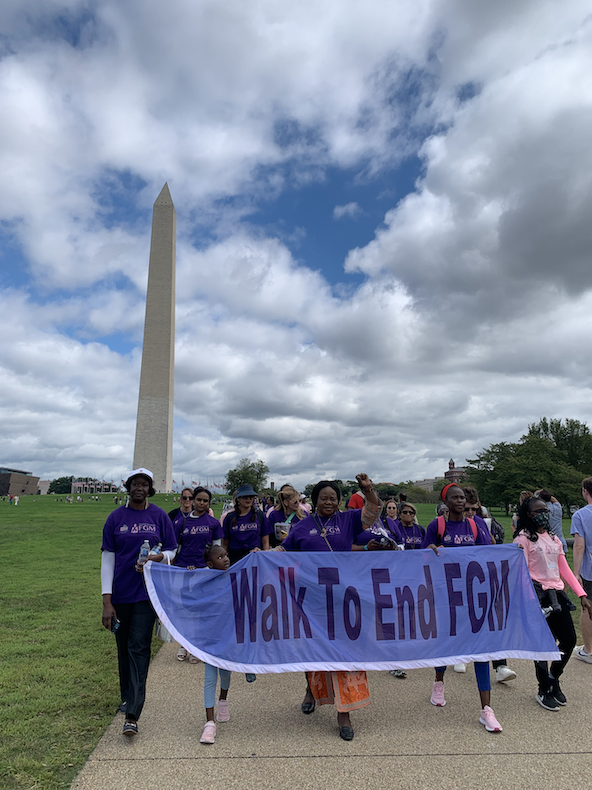
By Rachel Wine On September 30th, I had the honor of joining survivors, activists, and allies from around the world to participate in the 9th Annual Global Woman Awards the 10th Annual Walk to End FGM. I was grateful for the opportunity to meet with my peers in the anti-FGM/C field in-person, and share in the collective energy that is fueling the work to end this harmful practice. The ceremony kicked off with a musical performance, a keynote speaker, and opening remarks by the Global Woman P.E.A.C.E Foundation’s founder, Angela Peabody. The award ceremony began with the category of legal and policy work in the anti-FGM/C field; this year’s awardee was our very own Mariya Taher! Though Mariya was unable to attend the event in-person, I was excited to celebrate the recognition of her hard work and share some remarks on her behalf. I was eager to tell the crowd about Sahiyo’s work as Coalition members in Massachusetts, Washington, and Connecticut, and the successes of passing legislation in the former two states. I explained that passing legislation is only half the battle, and the other half is holding legislators accountable for upholding the law. I also emphasized the importance of holistic approaches to ending FGM/C, such as educational initiatives and programs for survivors. After accepting the award on Mariya’s behalf, I was delighted to hear about the accomplishments of the other awardees, including an educator, doctors, survivors, students, and more. I felt hopeful for the future of this work seeing many young activists in the crowd. When the award ceremony ended, the group gathered to walk from the Washington Monument to the Lincoln Memorial and back, united in chanting “No More FGM!” Many patrons of the National Mall stopped us to ask what FGM stood for; we shared pamphlets and information to educate them, and hopefully fueled their curiosity to learn more. As we sat on the steps of the Lincoln Memorial chanting, clapping, stomping, and cheering, I was reminded of the power of being a part of something bigger than myself. This event was something I won’t soon forget, and I’ll look forward to many future celebrations of our work to end FGM/C.
Volunteer spotlight: Policy intern Delia Donovan

Delia Donovan is an undergraduate student at Emmanuel College in Boston who is pursuing a bachelor’s degree in political science with a minor in theater arts. She is involved with multiple groups and organizations on campus, including Law and Legal Studies Club, Emmanuel Theater, and Radical Hope. As someone with a passion for social justice and human rights law, she is dedicated to uplifting the voices and validating the experiences of women through policy change. What was your experience of learning about female genital cutting (FGC) for the first time like? I’m pretty sure I learned about it while I was watching a horror movie. It was depicted as a practice that was a barbaric form of torture. Of course, I was frightened and confused by it, but I had no idea that this was an inaccurate depiction of what FGC truly is, nor did I realize how common it was within certain communities. When I was applying to join Sahiyo, I had already known that the practice existed but I wanted to learn more, so I did some research. The prevalence of the practice around the world was astounding to me. Once I joined Sahiyo, I learned about the context of why FGC is performed in certain communities and how to address FGC in a culturally sensitive manner. When and how did you first get involved with Sahiyo? I discovered a Sahiyo Development Internship application on my college’s career search engine. I decided to do more research on the organization because Sahiyo’s cause piqued my interest. When I went on the website, I found out that they were also looking for a U.S. policy intern. Being a political science major, this internship seemed like a perfect fit for me! What does your work with Sahiyo involve? The policy internship is relatively new, so I’ve been helping my supervisors build up the internship program. I’ve been working on a policy internship guide, which lists all of the tasks that I have been doing as a policy intern, so that this document can be referenced by other policy interns in the future. I work closely with the CT Coalition to End FGM/C, since Connecticut is one of the 9 states that doesn’t have a law that criminalizes FGC; I take notes for every coalition meeting we have, and reach out to other organizations to encourage them to join the coalition or offer their support. My supervisors and I have also been working on a policy cumulative report, which lists all of the policy and legislative work that Sahiyo has done in the past. This project was started before I joined the organization, but we are continuing to finalize it and it should be done around January. How has your involvement with Sahiyo impacted your life? My time at Sahiyo has been extremely meaningful to me. On a career level, I have been able to witness all of the work that it takes for a non-profit organization to garner support for passing a piece of legislation. Since I’m studying governmental systems in school, I know how long it takes to get legislators to agree on passing a piece of legislation, but it has been so interesting to see this happen from the perspective of a non-profit organization because we are the ones who are doing the community outreach and educating the public. On a personal level, I have been so inspired by all of the survivors of FGC that I have come into contact with and all of their stories. It’s really admirable that they are so dedicated to Sahiyo’s cause of ending FGC, because I can imagine this work cannot be easy as a survivor. It could mean reliving trauma for many people and setbacks must feel fairly personal, yet they continue to stay motivated. It’s an amazing thing to witness. Also, everyone that I have interacted with has been so kind and understanding. We’re all constantly wanting to learn from one another and help each other grow. What words of wisdom would you like to share with others who may be interested in supporting Sahiyo and the movement against FGC? Just because you are not a survivor of FGC doesn’t mean you shouldn’t get involved in helping to end the practice. I myself am not a survivor, and when I was applying for this position, I was worried about overstepping or that I should have more knowledge and experience about the practice. However, it is important for people who aren’t survivors to spread awareness about FGC to communities who don’t know enough about it. Many of my friends and family have not undergone FGC and know very little about the practice, but through my education and experience at Sahiyo, I am able to teach people what FGC really is, why the practice is done, and how we can help stop it. FGC cannot just be an isolated issue in the communities that it affects, awareness needs to be spread much more vastly if we want to end the practice all together.
Sahiyo U.S. Executive Director, Mariya Taher, receives Global Woman Award

Sahiyo is excited to announce that our U.S. Executive Director, Mariya Taher, has received a Global Woman Award from the Global Woman P.E.A.C.E. Foundation, for her work in Policy Making and Legal accomplishments. The Global Woman Awards were created in 2015 as a way to recognize the achievements of women, men, and students who are involved in the movement to end FGM/C. Each Awardee is carefully vetted and Sahiyo is so proud that Mariya has received this well-deserved award for all her hard work. Learn more about the Global Woman P.E.A.C.E. Foundation.
The overturning of Roe v. Wade and its implications for survivors of FGC
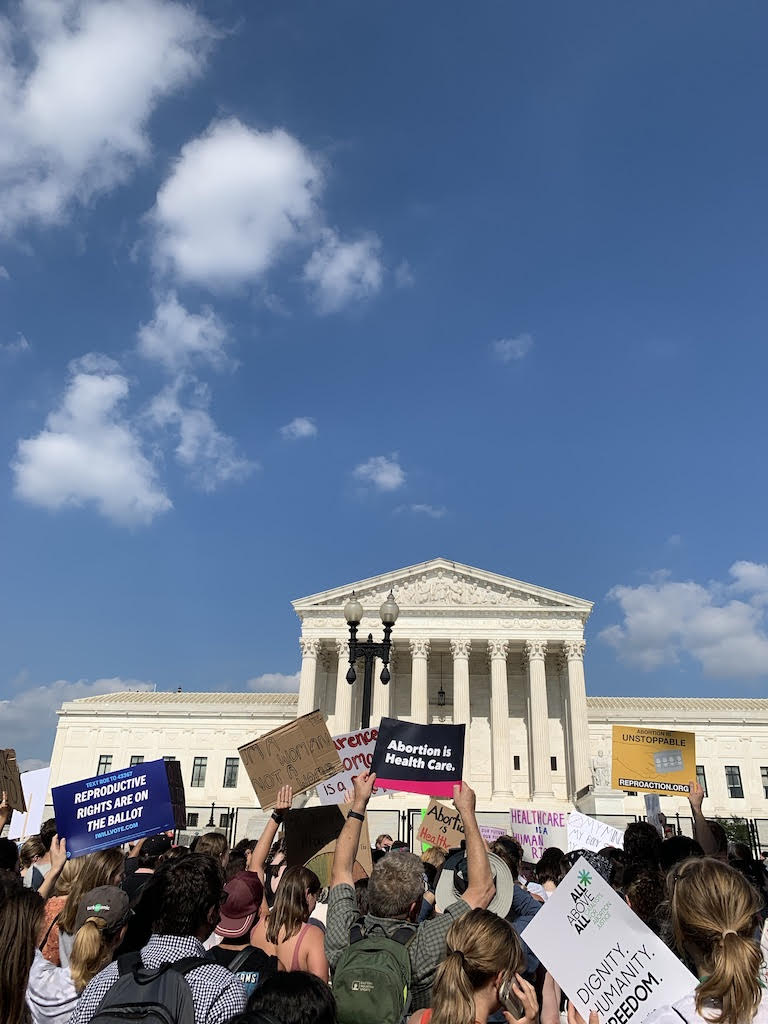
By Trisha Kini On June 24, 2022, the U.S. Supreme Court made the devastating decision to overturn Roe v. Wade, thus denying women and those assigned female at birth (AFAB) the right to safe abortions and bodily autonomy. Bodily autonomy, the foundation for gender equality, is a fundamental human right that impacts health, education, income, and safety. The lack of access to abortion in the absence of Roe vs. Wade not only has harmful consequences for people with unintended pregnancies, but could also disproportionately impact women and AFAB people who may belong to communities that practice female genital cutting (FGC). Several harmful health complications can arise during pregnancy or childbirth for a survivor of FGC. According to a study by the World Health Organization, the perinatal mortality rate of FGC (type III)* survivors was higher than non-survivors by 55%. The study also found that survivors had a higher rate of cesarean sections, genital tract trauma, and postpartum hemorrhages. Survivors of FGC deserve the right to equitable healthcare options to protect them from these potential high risk, life threatening consequences; this includes the right to safe and legal abortions. Sahiyo interviewed three professionals involved in the anti-FGC movement across public health, reproductive health, and law disciplines in an effort to understand if the overturning of Roe v. Wade could impact survivors of FGC. The following explores highlights of our conversations surrounding abortion, FGC, health disparities, and reproductive health stigma with Karen McDonnell, PhD, Associate Professor, Milken Institute School of Public Health, and Author of FGM Toolkit; Sakina Sharp, Co-Founder of Awaaz, Lawyer, and Sahiyo Board Member; and Lizzy Dupont, MD, OBGYN. *Also known as infibulation, FGC Type III is the narrowing of the vaginal opening through the creation of a covering seal (WHO) Reproductive Health, Justice, and FGC Reproductive health and justice, which are essential human rights, imply that persons should be able to have the choice and freedom to safely reproduce, and to decide if and when they want to do so. Both the overturning of Roe v. Wade and the harmful practice of FGC directly inhibit reproductive health and justice. Dr. Karen McDonnell, Associate Professor in Prevention and Community Health, emphasized that ruling Roe v. Wade is important for an individual’s right to bodily autonomy, and their sense of choice, trust, and safety. The overruling also disproportionately impacts those who experience distrust in healthcare, and this often includes survivors of FGC. “To have that trust be violated really does inhibit our reproductive justice and our reproductive health. FGC does affect women’s reproductive health and well-being. That has been demonstrated, and so by taking that freedom, trust, and care away, you’re already talking about a vulnerable group of women from the start. Now you’re making them even more vulnerable.” It is not uncommon for survivors of FGC to feel hesitant when seeking healthcare in general. Dr. Dupont works with individuals primarily identifying as women through adolescence, birth control consultation, and pregnancy of various types, including patients who have undergone FGC. She highlighted how excluding FGC as part of the medical school curricula impacts the quality of care providers offer, thus affecting survivors of FGC. “We’re certainly not trained (in most medical schools or residency programs) on how to care for women who have undergone FGM/C. And so patient’s anxieties about approaching us as providers or about having an exam are well-founded.” Could this additional layer of concern caused by the overruled Roe further result in barriers for survivors of FGC seeking abortions? Drawing Parallels: The Overruled Roe vs. Wade, FGC, and Bodily Autonomy We often found parallels in our conversations surrounding FGC and the overturn of Roe vs. Wade. Sakina Sharp, a lawyer who has several years of experience in advocacy against domestic violence and FGC, drew a preliminary connection to women’s agency when discussing the connection between the Dobbs decision (which overturned Roe v Wade) and FGC. “The issue of FGC is around taking away women’s agency. Decisions are made on behalf of women and little girls without them ever knowing about it or consenting. And the Dobbs decision does the same, right? It takes away women’s agency, it takes away their right to decide what they want to do with their bodies. You want to see laws trending in a way where in a modern society there is recognition of women as full beings and women being able to do what they want to do with their body.” Even though the overturn is not directly connected to the human/women’s rights issue of FGC, it is a step back in the movement to give women power over their bodies. Dr. Dupont drew a similar parallel when addressing the importance of respecting patients’ decisions. “In general, in all of reproductive health, we want to respect the patient’s autonomy and ability to make decisions for herself/themselves. I think, FGC and abortion care both fall under that ethical principle. The underlying principle is that as physicians or midwives, nurses, nurse practitioners, whatever provider may be seeing the patient, it’s our job to respect the patient’s autonomy and to support their desires clinically.” Health Disparities A study at Kaiser Family Foundation found that the overturning of Roe v. Wade disproportionately impacts women of color; this is caused by health disparities such as limited access to healthcare, as well as underlying systemic inequities that make access to abortion (particularly for those living in states where it is now illegal) more challenging. Dr. McDonnell explained that survivors of FGC may now be at a larger disparity, as FGC is largely practiced by communities of color. “When you look at the prevalence, when we ask about FGC worldwide, we do see that majority of women are women of color who have experienced FGC, so you’d take knowing that and then what the overturning of Roe v Wade is going to do to exacerbate those disparities and further limit the quality of care, the access to care. It goes to show that we are going to
Washington State becomes 41st state to pass law against FGM/C
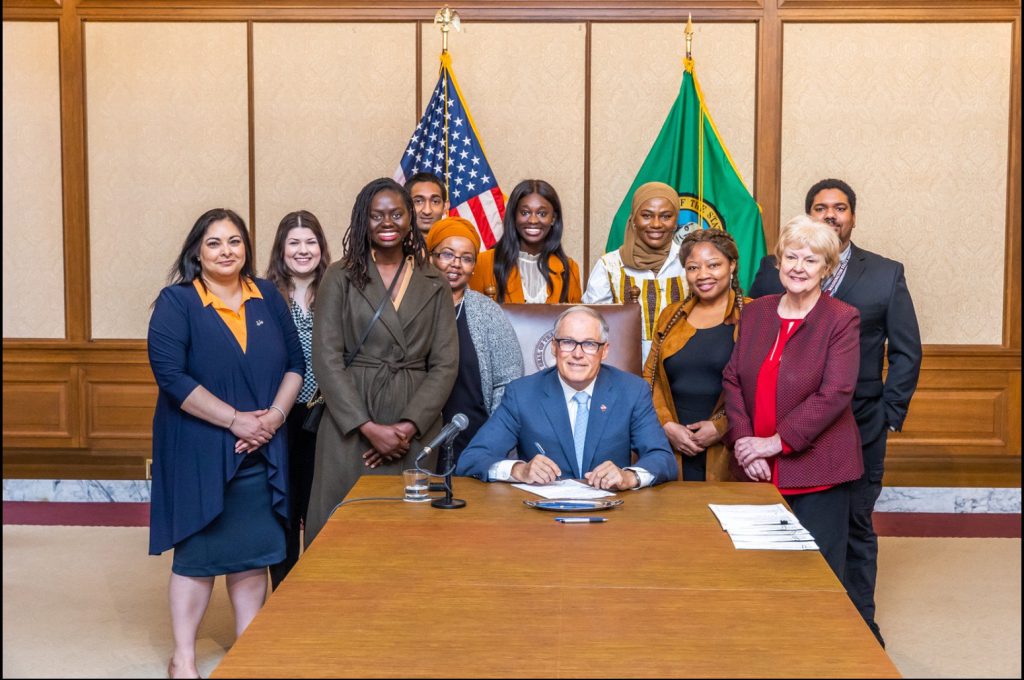
Sahiyo, as part of the Washington Coalition to End FGM/C, is ecstatic to announce that on April 20th, 2023, Washington state Governor Jay Inslee signed Senate Bill 5453 concerning female genital mutilation/cutting (FGM/C) into law. This law creates a private right of action for survivors of FGM/C; prohibits providers from performing FGM/C on a minor; establishes education and outreach initiatives to prevent FGM/C; and provides care for victims and families of FGM/C. Many thanks and congratulations to all who were involved in this legislative process! Below are reactions to the bill’s passage by members of Washington Coalition to End FGM/C. This survivor- and community-led coalition was instrumental in advocating for and gathering support to make this law a reality. “SB 5354 passing is a victory and an emotional moment on so many levels. The power of the collective work and collaboration of the coalition members and affected communities is a living example of the power of community engagement/involvement. The representation and story shared is so real and compelling. The coalition work is not yet over, the coalition work model should be replicated to propose similar bills in the remaining nine states. More importantly, the bulk of the work starts after SB 5354 was signed by the Governor. The goal is to make sure appropriate pathways, educational programs, and materials developed to meet these communities’ needs are culturally sensitive and will maintain families well beings, as well as promote healing; and the community should have access (parents, children, and professionals). I am so proud to be a part of this great coalition.” ~Dr. Muna Osman “Passing this bill is long overdue, and I feel proud to see Washington state join the 40 other states that have acted to end this practice. The collaborative work of our coalition that led to the passing of SB 5453 in Washington can serve as a model for the 9 other states that have yet to act against female genital cutting. This law presents an opportunity for a much-needed conversation and education on FGC in our communities and is a critical step towards advancing gender equity and human rights while safeguarding future generations of girls and women from this harmful practice.” ~Absa Samba “It’s absolutely amazing to see that Washington has become the 41st state to pass a law to protect children from female genital mutilation/cutting. Over the past 10 years, I’ve been fortunate to be part of survivor-led coalitions in Massachusetts and Connecticut that have sought to create change when it comes to ending this harmful practice. I am amazed by just how quickly we were able to form a survivor-led coalition in Washington, and I am forever grateful that our bill sponsor, Senator Keiser understood the importance of ensuring that the language of this bill was based on feedback from FGC-impacted communities themselves.” ~Mariya Taher, Executive Director, Sahiyo U.S. “The only way the United States can effectively advance gender equality is if we lead by example. And that starts, here at home. Five years ago, I started a petition to push Washington state to ban FGM, mobilizing over 170,000 supporters along the way. I’m grateful for Absa Samba, a bright light and young leader who convened survivors from diverse backgrounds, to craft legislation that balances prosecution and prevention in a way that can serve as a model for not just Washington state, but the world. The passing of this bill illustrates how survivor-fueled advocacy can lead to sustainable social change.” ~Maryum Saifee “I joined Absa Samba as she created a coalition of diverse Washington State women who live in communities affected by FGM, were bravely willing to share their personal experience with FGM, and share a commitment to curbing this practice through the passage of SB 5453. As a professor of anthropology with decades of experience studying strategies to end FGM, I offered testimony on the proven importance of legislation as a tool for change, particularly when it funds outreach and education. When families and community members deliberate upon whether a girls should undergo FGM, knowledge of the law strengthens the power of persuasion of those who no longer endorse the practice. As such, the law will strengthen efforts to prevent girls in Washington State from being subjected to the practice of FGM.” ~Bettina Shell-Duncan “The U.S. End FGM/C Network is thrilled to see the passing of SB5453, making Washington State the 41st state in the U.S. to take a stand against FGM/C. This new law sets a precedent for the remaining 9 states to pass comprehensive, holistic laws to protect women and children across this country. We also know that this is only the first step and we look forward to working with the WA Department of Health, the WA Coalition to End FGM/C, impacted communities, and other stakeholders to ensure that this law is implemented to its fullest potential.” ~Caitlin LeMay, Executive Director, The U.S. End FGM/C Network “Children’s Alliance is honored to have had the opportunity to work alongside an incredible team of FGM/C survivors and advocates to pass this critically important legislation. Washington state was a laggard in providing protections against this practice; our state’s children and youth will greatly benefit from the work of this coalition.” ~Dr. Stephan Blanford, Executive Director, Children’s Alliance “It saddens me that it is 2023, and young girls are still at risk of facing FGM/C or have already experienced such a traumatic incident. It is heartbreaking and needs to come to an end. This bill is one step closer to making young girls feel safe in Washington. This bill is hope, hope that young girls in Washington will not experience such a violent act. Now, it’s time to work on an effective implementation that will change their lives.” ~Mother Africa “We applaud Washington lawmakers for taking this critical step in the fight to eradicate the practice of FGM in the United States, and call on the remaining nine states to take similar action. FGM is
Washington State makes progress to end FGM/C
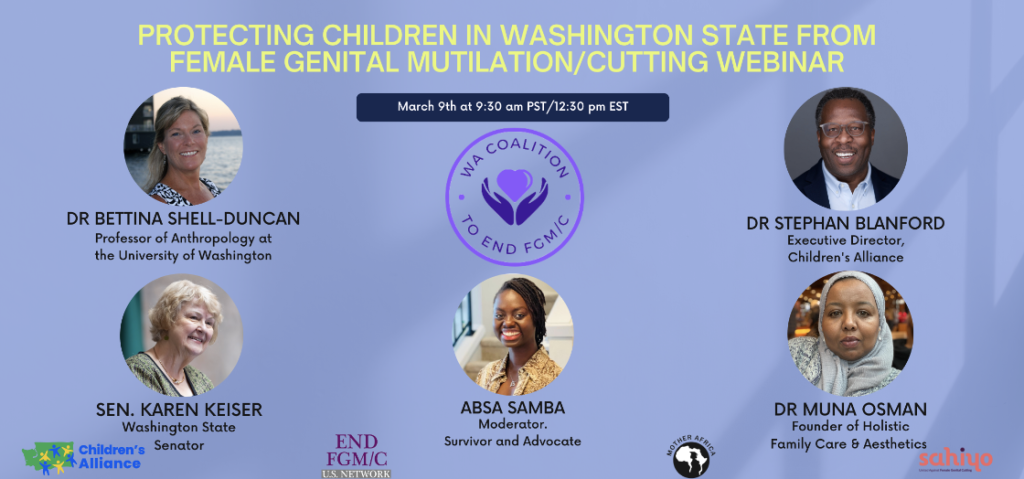
Washington State is one of the remaining ten U.S. states without any law that addresses and prohibits female genial mutilation/cutting (FGM/C). FGM/C is a human rights violation and form of child abuse and gender-based violence that involves removal of the female genitalia for non-medical purposes. This gap in state protection has left children in Washington vulnerable to this harmful practice. In fact, an estimated 25,000 women and girls in Washington are living with or at risk of undergoing FGM/C. The Seattle-Tacoma-Bellevue metro area is considered the 5th highest metro area in the U.S. in terms of the size of the FGM/C-affected community. In 2019, a change.org petition that gained 170,000+ signatures was started to address this lack of protection for children. “Washington state is #18 for gender equality by US News and World Report. Gender Equality should be a priority in Washington state. Social, political, and economic equality and equity is limited when we don’t have the full participation of all of our women and girls. Harmful customs or social norms that contribute to GBV (gender-based violence) including FGM/C in addition to costing lifelong pain and suffering can hold women, girls, and others who have undergone FGM/C back from full participation.” ~ Absa Samba The Washington Coalition to End FGM/C was created to educate people in the state about the need for policy solutions to address FGM/C. The coalition is made up of survivors, community organizations, legislators, advocates, and others. On March 9th the Washington Coalition to End FGM/C held a webinar in partnership with Sahiyo, The U.S. End FGM/C Network, Children’s Alliance, and Mother Africa to help shed light on how FGM/C impacts those living in Washington state, and to discuss policy level solutions, community-based programs, and education initiatives needed to protect women, girls, and others from undergoing this harmful practice. Speakers included: Absa Samba, a student, activist, and survivor of FGM/C who helped found the Coalition and made contact with Washington Senators to sponsor a bill against FGM/C, Bettina Shell Duncan, a Professor of Anthropology at the University of Washington in Seattle who has done extensive research on FGM/C, Stephan Blanford, the Executive Director of Children’s Alliance, Muna Osman, Doctorate Prepared Nurse Practitioner, founder of holistic family care clinic, a co-founder of mama amaan research team, and survivor, Senator Karen Keiser (D-WA 33), sponsor of SB 5453, a bill that will make FGM/C illegal in Washington State. Speakers helped to shed light on the issue of FGM/C by discussing what it was, who it impacts, and most importantly, that it does affect residents of Washington. The vital need for policy to end FGM/C amongst future generations of children was also discussed. “The pressure to undergo FGM can be intense for girls and their families…the solution is to coordinate change in families and communities so that people are not acting in isolation. If everybody can agree to abandon the practice, the negative sanctions can be lifted…When other members of the community are given the power of law to strengthen their position, the law becomes a powerful tool for enhancing their power to persuade others that this is a practice that’s no longer relevant in this context and in this time.” ~ Bettina Shell Duncan, panelist The coalition has supported policy work by working on the passage of Washington Senate Bill 5453. This bill, informed by the Washington Coalition to End FGM/C, has been championed by state Senator Karen Keiser and, if passed, will prohibit FGM/C on minors, creates a civil cause of action for survivors of FGM/C, and establishes an education program to prevent FGM/C in Washington. “This education component of this bill is huge for our [Somali] community. I think this bill coming from us, for us, by us, to help the community, I think it is a beautiful thing. I am confident that the community will accept it.” ~ Muna Osman, panelist During the event, audience members were also called to action to support the bill by signing onto an action alert. As of March 29, Senate Bill 5453 has passed the Washington state Senate unanimously and is making its way through the House of Representatives. Similar legislation was introduced in the Washington legislature in 2019 but it did not pass; a key difference between the two campaigns is that this year in 2023, the bill is backed by a strong coalition of directly-impacted survivors, advocates, community members, health practitioners, human rights activists, policymakers, faith based groups, and other allies. Whereas in 2019, there was a lack of inclusion of FGC impacted communities who lived in Washington in the crafting of the legislation. The unanimous support from legislators this year is a strong indication that Washington state will become the 41st state to pass a law to prohibit and prevent FGM/C.
